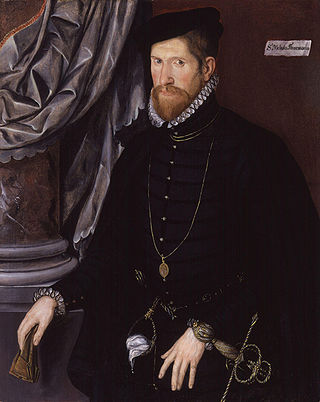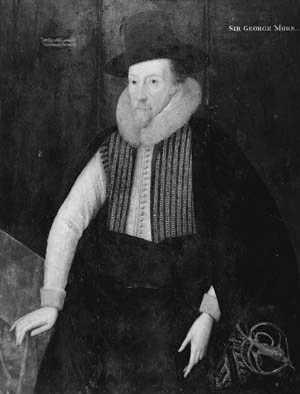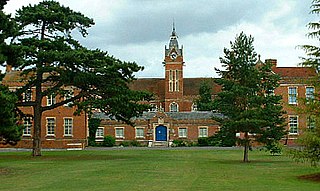Related Research Articles

Beddington is a suburban settlement in the London Borough of Sutton on the boundary with the London Borough of Croydon. Beddington is formed from a village of the same name which until early the 20th century still included land which became termed entirely as Wallington. By the 13th century, the latter was also partially known as Hakebrug, and named after a bridge on the River Wandle. The locality has a landscaped wooded park at Beddington Park – also known as Carew Manor; and a nature reserve and sewage treatment works in the centre and to the north of its area respectively. The population of Beddington according to the 2011 census is 21,044.

Sir Nicholas Throckmorton was an English diplomat and politician, who was an ambassador to France and later Scotland, and played a key role in the relationship between Elizabeth I of England and Mary, Queen of Scots.

Sir Nicholas Carew KG, of Beddington in Surrey, was an English courtier and diplomat during the reign of King Henry VIII. He was executed for his alleged part in the Exeter Conspiracy.
Nicholas Carew may refer to:

Nicholas Carew, of Beddington in Surrey, was an English lawyer, landowner, courtier, administrator and politician who served as Keeper of the Privy Seal during the reign of King Edward III.
Sir Richard Onslow was an English politician who sat in the House of Commons at various times between 1628 and 1664. He fought on the Parliamentary side during the English Civil War. He was the grandson of one Speaker of the House of Commons and the grandfather of another, both also called Richard Onslow.

Elizabeth Carew was an English courtier and reputed mistress of King Henry VIII.
John Sackville MP was a member of parliament for East Grinstead, and a local administrator in Essex, Sussex and Surrey. His first wife was Margaret Boleyn, an aunt of Henry VIII's second Queen, Anne Boleyn, and a great-aunt of Queen Elizabeth I.
Sir Arthur Throckmorton was an English courtier and politician.
Sir Poynings More, 1st Baronet (1606–1649) was an English politician who sat in the House of Commons at various times between 1624 and 1640.

Sir George More was an English courtier and politician who sat in the House of Commons at various times between 1584 and 1625.

Sir William Strode (1562–1637) of Newnham in the parish of Plympton St Mary, Devon, England, was a member of the Devon landed gentry, a military engineer and seven times a Member of Parliament elected for Devon in 1597 and 1624, for Plympton Erle in 1601, 1604, 1621 and 1625, and for Plymouth in 1614. He was High Sheriff of Devon from 1593 to 1594 and was knighted in 1598. In 1599 he was appointed Deputy Lieutenant of Devon. There is a monument to him in the parish church of Plympton St Mary.
Sir Robert More was an English politician who sat in the House of Commons from 1601.
Sir Francis Carew (1602–1649) was an English politician who sat in the House of Commons between 1624 and 1626.

Sir William More, of Loseley, Surrey, was the son of Sir Christopher More. The great house at Loseley Park was built for him, which is still the residence of the More Molyneux family. Of Protestant sympathies, as Sheriff and Vice-Admiral of Surrey he was actively involved in local administration of the county of Surrey and in the enforcement of the Elizabethan religious settlement, and was a member of every Parliament during the reign of Queen Elizabeth I. He was the owner of property in the Blackfriars in which the first and second Blackfriars theatres were erected. He has been described as "the perfect Elizabethan country gentleman" on account of his impeccable character and his assiduity and efficiency of service.
Sir Nicholas Saunders was an English landowner and Member of Parliament. He was a Catholic but became a member of the Church of England and parliament. He had to sell property due to financial problems. His later life is known in some detail due to the extant diary of his daughter Isabella Twysden.
Sir Christopher More was an English administrator, landowner, and Member of Parliament. More was the son of John More, a London fishmonger, and his wife, Elizabeth. He was active in local administration in Sussex and Surrey, and from 1505 until his death held office in the Exchequer, rising in 1542 to the post of King's Remembrancer. His sister, Alice More, was the fourth wife of Sir John More, father of Sir Thomas More.

Sir Nicholas Carew, 1st Baronet, of Beddington, near Croydon was a landowner and Whig politician who sat in the House of Commons between 1708 and 1727.
Francis Carew (1530?–1611), of Beddington, Surrey was an English politician.

Nicholas Carew, Lord of Moulsford, was a baron of medieval England who took part in the Wars of Scottish Independence.
References
- ↑ H.E. Malden, ed. (1912). "Parishes: Coulsdon". A History of the County of Surrey: Volume 4. Institute of Historical Research. Retrieved 20 October 2013.
- 1 2 3 History of Parliament Online -Throckmorton (afterwards Carew), Nicholas
- ↑ Alfred John Kempe, Loseley Manuscripts (London, 1836), pp. 360-1.